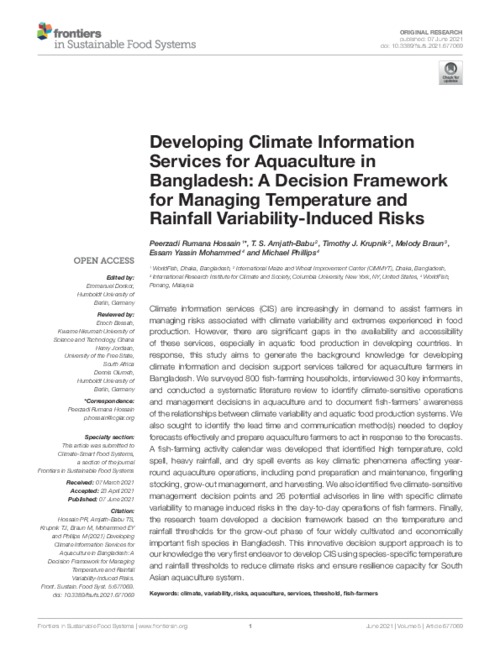Developing Climate Information Services for Aquaculture in Bangladesh: A Decision Framework for Managing Temperature and Rainfall Variability-Induced Risks

Climate information services (CIS) are increasingly in demand to assist farmers in managing risks associated with climate variability and extremes experienced in food production. However, there are significant gaps in the availability and accessibility of these services, especially in aquatic food production in developing countries. In response, this study aims to generate the background knowledge for developing climate information and decision support services tailored for aquaculture farmers in Bangladesh. We surveyed 800 fish-farming households, interviewed 30 key informants, and conducted a systematic literature review to identify climate-sensitive operations and management decisions in aquaculture and to document fish-farmers' awareness of the relationships between climate variability and aquatic food production systems. We also sought to identify the lead time and communication method(s) needed to deploy forecasts effectively and prepare aquaculture farmers to act in response to the forecasts. A fish-farming activity calendar was developed that identified high temperature, cold spell, heavy rainfall, and dry spell events as key climatic phenomena affecting year-round aquaculture operations, including pond preparation and maintenance, fingerling stocking, grow-out management, and harvesting. We also identified five climate-sensitive management decision points and 26 potential advisories in line with specific climate variability to manage induced risks in the day-to-day operations of fish farmers. Finally, the research team developed a decision framework based on the temperature and rainfall thresholds for the grow-out phase of four widely cultivated and economically important fish species in Bangladesh. This innovative decision support approach is to our knowledge the very first endeavor to develop CIS using species-specific temperature and rainfall thresholds to reduce climate risks and ensure resilience capacity for South Asian aquaculture system.
Permalink
Date Available
Type
Publisher
Countries
ISSN
2571-581X
Copyright
CC-BY-4.0
Research Themes
Topics
Language